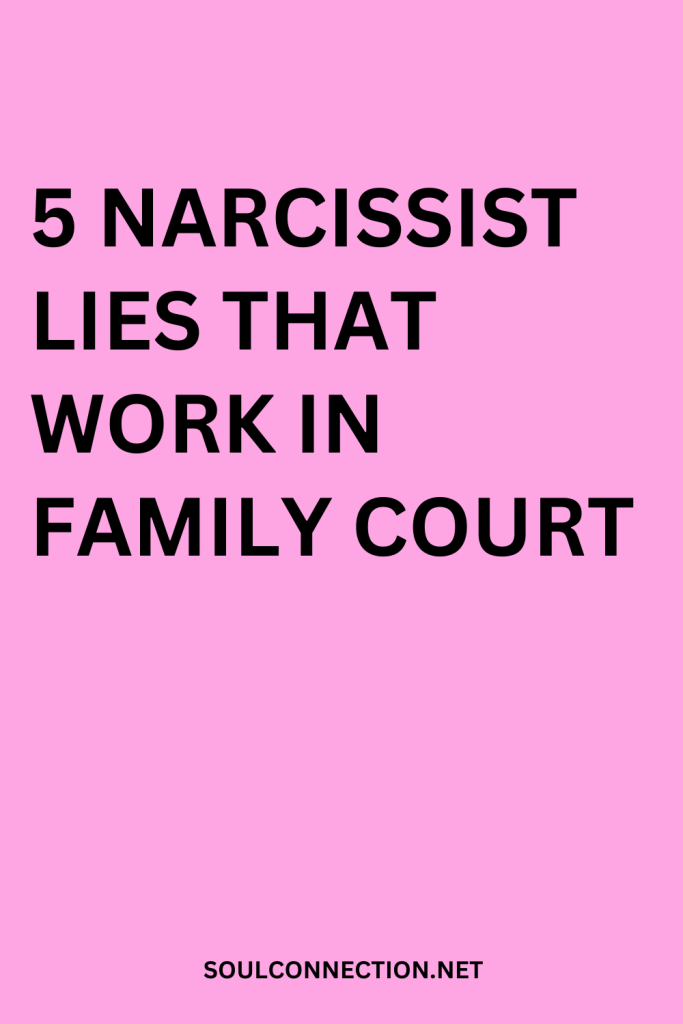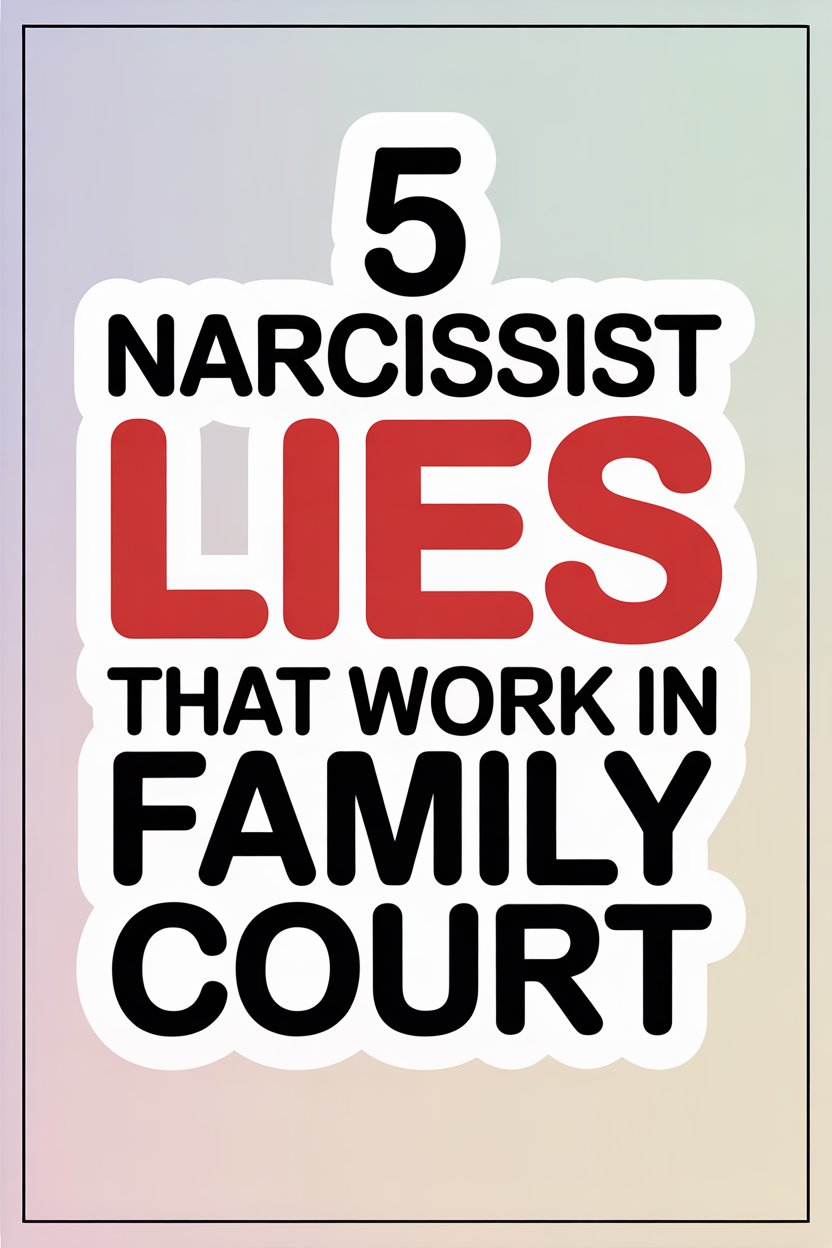Family court: where dreams go to die and narcissists arrive armed with a suitcase full of lies and just enough charm to make a judge consider running for the hills.
Anyone who’s wrangled with a narcissist in this arena knows the special horror of seeing reality get twisted into a balloon animal—right there in a room full of professionals.
Buckle up. If you’ve ever wondered how those fibs seem to stick, or how to spot them before they trip you up, here are five of the classics straight from the narcissist’s playbook.
1. I’m the Victim Here, Your Honour
Narcissists can turn victimhood into an Olympic sport. Suddenly, the person who called you every name under the sun or ignored your child’s basic needs is dabbing their eyes on the witness stand, painting you as the villain.
Their storytelling skills are impressive: they’ll recall your “erratic” behaviour (like crying after their 12th affair), your “threats” (remember when you said you’d get a lawyer?), and your “refusal to compromise” (for not giving them the kids every Christmas until 2049).
It’s emotional manipulation, starring them as the tragic hero.
If you’re on the receiving end, document everything. Keep communication in writing. When they claim you’re the one causing problems, your receipts—dates, texts, emails—are your sword and shield.
Just the facts, ma’am. Judges respect evidence, not theatrics.
2. I’m the Most Involved Parent
Ah yes, the parent who couldn’t find the school office with a GPS and Google Maps suddenly knows every detail about their child’s life. In court, a narcissist’s memory for parental involvement gets a miraculous upgrade.
They’ll swear they’ve attended every recital (even the ones you both missed because your kid had chickenpox), made every lunch, and been the bedtime story MVP since birth.
The judge, who doesn’t live in your house, might just believe them—especially if they deliver it with enough confidence to make even you question your recollection.
Counter this by organizing proof of actual involvement: calendars, school reports, teachers’ notes, and photos. If possible, ask neutral third parties—teachers, coaches, even neighbours—to provide a statement.
Don’t rely on “everyone knows”; narcissists count on your silence.
3. My Ex Is Alienating the Kids
Parental alienation: the narcissist’s favourite buzzword. They’ll insist the only reason the kids are distant or upset is because you’re poisoning their minds.
Never mind the years of neglect, broken promises, or scary shouting matches—they’ll pin it on your “campaign” against them.
Judges take alienation seriously, and narcissists know it. Suddenly, your efforts to protect your children from chaos get recast as manipulation.
This one’s tough, because even good co-parents disagree sometimes—how do you prove you’re not alienating?
Stay consistent and positive with your kids about their other parent. Avoid bad-mouthing, even if you’d prefer to send your ex on a one-way trip to Antarctica.
Keep records of your efforts to encourage contact—texts arranging visits, reminders of holidays, cards signed “love, Mum and Dad.” It’s not about painting yourself as perfect, but showing you’re not the monster they claim.
4. I’d Never Lie or Manipulate
If only nose growth was a legal indicator. Narcissists are, quite frankly, allergic to the truth when it doesn’t fit their narrative.
In court, this means denying abuse (even with photos), rewriting history, and spinning every interaction—no matter how small—into a tale of your incompetence.
They’ll say, “I just want what’s best for the children,” while simultaneously trying to win full custody, zero child support, and the house. Gaslighting becomes their native language, and they expect the judge to be fluent.
Here’s where it gets sneaky: narcissists often appear calm and composed, while you might look emotional or frazzled. This can sway perception, because courts expect people to act like robots, not parents under siege.
Don’t take the bait. Stick to facts, not feelings. If you’re accused of lying or manipulation, ask your lawyer to request evidence—narcissists rarely have any.
5. The Kids Are Perfectly Fine With Me
This lie is the cherry on top. Your ex, who barely remembered to feed the goldfish, will claim the children are thriving during their weekends—never mind the “lost” homework, missed medications, or late-night phone calls home.
Narcissists are experts at hiding dysfunction behind a smiling Instagram post or a well-rehearsed speech. They’ll insist the kids are happy, healthy, and just love spending time with them.
The truth? Kids often feel anxious, confused, or overwhelmed, but might not have the words—or bravery—to say so in court.
If you’re concerned, don’t rely on the kids to testify. Judges hate putting children in the middle. Instead, gather objective evidence: school attendance, health records, reports from doctors or counsellors.
If issues pop up only during their time with your ex, patterns emerge. Judges notice patterns. So do narcissists, but only when it serves their story.
How to Defend Yourself Without Losing Your Mind
It’s enough to make anyone want to move to a deserted island (no custody exchanges, just coconuts). Facing these lies head-on is exhausting, but there are ways to keep your sanity—and maybe even your sense of humour.
- Stick to facts, not emotion
Judges are swayed by details, not drama. The narcissist will already be providing plenty of the latter. - Document, document, document
Keep records of communication, visits, and anything out of the ordinary. A well-organized file is your best friend. - Lean on third parties
When possible, let teachers, doctors, or other neutral folks do the talking. Their word often carries more weight. - Stay calm
Easier said than done, yes. But the less reactive you look, the more the narcissist stands out. - Get a realistic lawyer
Find someone who gets high-conflict personalities and isn’t afraid to push for court orders that protect your kids.
When Judges Buy the Lies
Even the best preparation can’t guarantee victory. Sometimes judges fall for the performance, especially when narcissists cry crocodile tears or quote parenting books they’ve never read.
Frustrating? Absolutely.
But court orders aren’t set in stone. If things go off the rails—a missed pickup here, a “lost” school report there—keep notes. File for modifications if needed.
Courts prefer consistency, and over time, patterns speak louder than any speech.
Don’t beat yourself up if a narcissist gets away with something in the short term. Family court isn’t fair, but it isn’t hopeless, either. Long-term, truth has a nasty habit of poking its head up—often at the least convenient time for the narcissist.
Healing Doesn’t Happen in the Courtroom
The truth is, family court is rarely the place where justice feels like justice. Narcissists can and do win battles, but that doesn’t mean they win the war.
Your resilience, your ability to keep showing up for your kids, and your refusal to stoop to their level? Those are the things that matter most.
Here’s the best-kept secret: your kids notice. Maybe not today, maybe not even next year, but eventually. Keep fighting for them and for yourself.
And if all else fails, there’s always chocolate, a good therapist, or a really solid rant with a mate who gets it.
Surviving family court with a narcissist is a feat worthy of its own reality show. Since the producers haven’t called (yet), take heart in knowing you’re not alone.
And the next time you hear one of those lies, give yourself a little wink. You know the truth.
And, with any luck, so will the court—eventually.


